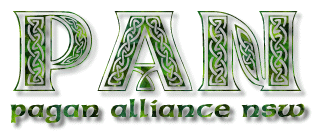|
Beltane 1997 Newsletter The Meaning Of Beltane |

|
Beltane is also celebrated by its Northern Hemisphere name of May Eve or May Day. In the Southern Hemisphere is it celebrated by some as the last evening of October, the first day in November, or the first evening in November. Beltane is opposite Samhain on the wheel of the year and it is considered to be one of the major festivals on the wheel of the year.
The most famous symbol of Beltane is the Maypole. The pole itself is a phallic representation, with white ribbons for death, red for the blood of life, or red for the sun god, white for the virgin goddess, or white for the maiden and red for the mother (as you can see there are many variations depending on your tradition). The ribbons are woven together, traditionally by an equal number of men and women, and represent the rebirth of fertility for the land and it's inhabitants.
The Celts celebrate Beltane as the day the Tuatha De Dannan (the children of the Goddess Danu) landed on Irish shores. It is said that they brought the sun to the land, and are celebrated as the "light" aspect of Celtic Mythology. The Tuatha De Dannan live in the otherworld, in mounds under the earth called Sidhes. The veil between this world and the otherworld is thin at this time of year (like at Samhain), and the two worlds intermingle easily on this day.
It is a time for the Celts to collect the nine sacred woods for the kindling of the "bale fire". Animals and people are driven between the sacred flames to purify them and ensure fertility for the coming year. Wiccans jump the cauldron for the same symbology. In particular, cattle were purified for the Celts, because of the importance of cattle for food, clothing, milk and therefore survival. We can see the importance of cattle in many Celtic stories, in particular The Tain Bo Culaigne. (If you are interested in reading this story I would recommend Thomas Kinsella's translation of The Tain, as a good place to start. Early Irish Myths and Sagas by Gantz is a good introduction to Celtic literary traditions and mythological stories).
An old folk custom for Beltane is to leave a wash cloth out overnight to collect the new days dew. It is said that if you was your face with this dew, you will receive love and beauty in your life.
Because of the significance of fertility at this time of year, it has increasingly become known as a time for Handfastings. This is because Beltane is seen as the time when the Maiden marries the young God, they consummate the marriage on Beltane, and she conceives.
You might like to place fresh flowers on your altar and in your cauldron. If you are not able to make a large Maypole, you may like to make a small version for your altar to remind you of the season. Now is the time to take action on the dedications you made or planned at Ostara. The seed has now germinated and needs your help to grow to its full potential.
Nature is a wheel
(anonymous)
Nature is a wheel
Life has no end
When the cycle is complete
We begin again.
![]()